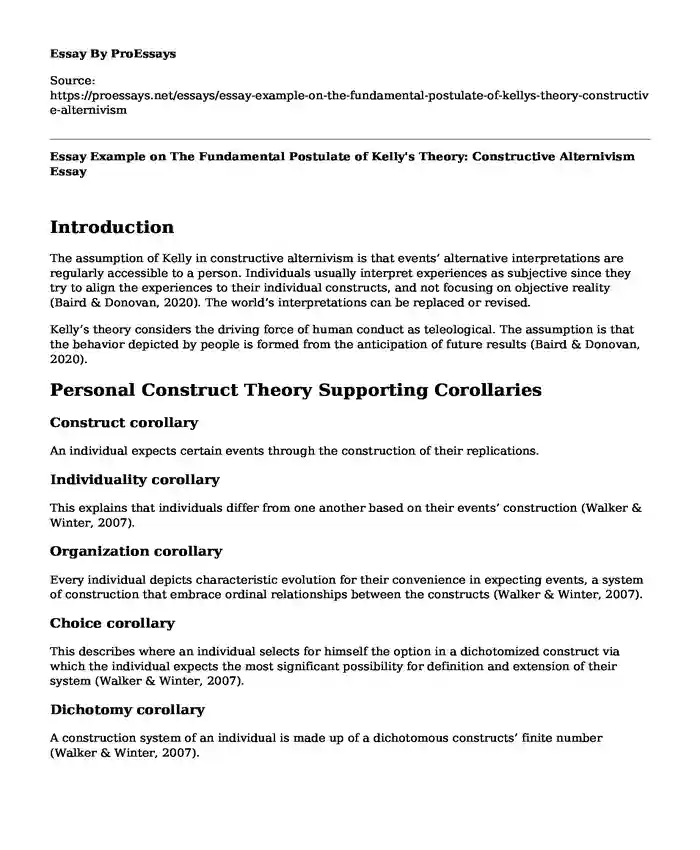Introduction
The assumption of Kelly in constructive alternivism is that events’ alternative interpretations are regularly accessible to a person. Individuals usually interpret experiences as subjective since they try to align the experiences to their individual constructs, and not focusing on objective reality (Baird & Donovan, 2020). The world’s interpretations can be replaced or revised.
Kelly’s theory considers the driving force of human conduct as teleological. The assumption is that the behavior depicted by people is formed from the anticipation of future results (Baird & Donovan, 2020).
Personal Construct Theory Supporting Corollaries
Construct corollary
An individual expects certain events through the construction of their replications.
Individuality corollary
This explains that individuals differ from one another based on their events’ construction (Walker & Winter, 2007).
Organization corollary
Every individual depicts characteristic evolution for their convenience in expecting events, a system of construction that embrace ordinal relationships between the constructs (Walker & Winter, 2007).
Choice corollary
This describes where an individual selects for himself the option in a dichotomized construct via which the individual expects the most significant possibility for definition and extension of their system (Walker & Winter, 2007).
Dichotomy corollary
A construction system of an individual is made up of a dichotomous constructs’ finite number (Walker & Winter, 2007).
Experience corollary
It describes the construction system of an individual is different as the person successively construes the events’ replication (Walker & Winter, 2007).
Range corollary
This explains that a construct is deemed suitable for the expectation of entirely limited events’ range (Walker & Winter, 2007).
Modulation corollary
It describes the differences in an individual’s construction system as limited by the constructs’ permeability where the variants lie in the range of convenience (Walker & Winter, 2007).
Commonality corollary
It explains the degree that an individual utilizes experience construction perceived a different person’s similar experience construction (Walker & Winter, 2007). Their psychological processes are deemed similar to those expressed by the other individual.
Fragmentation corollary
It describes that an individual is likely to successfully use various construction subsystems that are perceived as inferentially incompatible with one another (Walker & Winter, 2007).
Sociality corollary
This explains the degree that an individual usually construes the process of construction depicted by a different person, he or she is likely to play a key role in a social process and where he involves the other individual (Walker & Winter, 2007).
Peripheral Role and Core Role
The sociality corollary includes the concept of role. It is explained as the behavior pattern from the understanding we express towards the constructions of other people. An individual is perceived to have a core role and a variety of peripheral roles (Lester, 2009). The sense of identity of an individual is integral to his or her existence of their core role (Lester, 2009). Alternatively, the peripheral roles do not dominate the self-concept of a person.
Kelly’s point of view of threat
There are four well-known components in the majority of human distractions, including guilt, fear, threat and anxiety. According to Kelly, the threat is among the common factors in most of the disturbances in humans (Chiari, 2013). It is explained as individuals’ awareness that among our most fundamental constructs could experience significant manipulation.
Kelly’s point of view of anxiety
Kelly holds that anxiety includes one of the well-known factors in the majority of human disturbances (Chiari, 2013). He explains it as the awareness of a person that they lack enough skills to address new experience that they face.
Abnormal development by Kelly
Abnormal people are considered not in a position to validate individual constructs against their world’s experiences. They tend to cling on outdated constructs and fear the new constructs are likely to disrupt the world’s status quo. An unhealthy individual will distort or reject new approaches. The construction system of a person does not exist in future events, but entirely in the present. They are objected to the traditional classification of abnormalities’ system. The constructs are deemed as unique to an individual and not universal (Curtis & Kelley, 2016). Unhealthy personal constructs of an individual fail to pass the permeability test based on two ways; first, it is likely to be too flexible, and the individual is not in a position to adjust to the reality. The second way is that of the personal construct is too loose.
Conclusion
A client typically is involved in a particular preestablished role for several weeks. The role is played with the purpose of helping the client establish the exposed parts of the clients that they were not aware of in the past.
References
Baird, J. C., & Donovan, B. (2020). Constructive Alternativism and the Mind-Body Problem. https://doi.org/10.1080/10720537.2020.1756014
Chiari, G. (2013). Emotion in personal construct theory: A controversial question. Journal of Constructivist Psychology, 26(4), 249-261.
https://doi.org/10.1080/10720537.2013.812853
Curtis, D., & Kelley, L. (2016). Abnormal psychology: myths of crazy. Kendall Hunt Publishing Company.
Lester, D. (2009). Emotions in personal construct theory: A review. Personal Construct Theory & Practice, 6, 90-98.
Walker, B. M., & Winter, D. A. (2007). The elaboration of personal construct psychology. Annual Review of Psychology, 58.
https://doi.org/10.1146/annurev.psych.58.110405.085535
Cite this page
Essay Example on The Fundamental Postulate of Kelly's Theory: Constructive Alternivism. (2023, Oct 11). Retrieved from https://proessays.net/essays/essay-example-on-the-fundamental-postulate-of-kellys-theory-constructive-alternivism
If you are the original author of this essay and no longer wish to have it published on the ProEssays website, please click below to request its removal:
- Practicing as a Christian Counselor Paper Example
- Essay Example on Depression: A Global Crisis That Needs Attention
- Paper Example on Altruistic Love Leads to Happier Marriages
- Essay on 7 Dimensions of Wellness for Mental Health & Child Development
- Unlocking Personality: Exploring the Thematic Apperception Test - Essay Sample
- Essay Example on Black, White & Red, Smile Baby: Cognitive Stimulation Toy for Babies
- Essay Example on Education: The Key to Modernization and Living A Fulfilling Life







